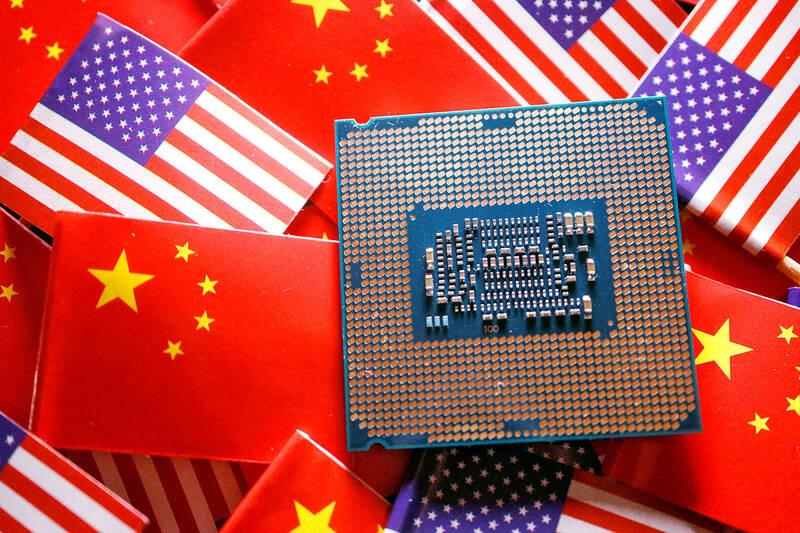Chinese hackers breached the Republican National Committee’s (RNC) internal communications in July last year to discover how the party was planning to address Taiwan, the Wall Street Journal reported yesterday.
The RNC had previously called for a free-trade agreement with Taiwan in its 60-page platform from 2016.
However, by last year, the platform had been cut down to 16 pages and made no mention of Taiwan.

Photo: Reuters
The article was based off of an excerpt from Alex Isenstadt’s upcoming book Revenge: The Inside Story of Trump’s Return to Power, which reveals the previously unreported breach.
The Journal said it viewed an excerpt of the book, which is to be released next month, and verified the hack.
The security breach occurred as the RNC was preparing for its national convention in Milwaukee in July last year, people familiar with the matter told the author.
Microsoft informed top party officials in early July that the hackers had access to the RNC e-mail system for months, the people said.
However, top RNC officials and the cochair of US President Donald Trump’s campaign, Chris LaCivita, did not alert the FBI of the hack, as they were concerned the information would be leaked to the media, sources said.
Parts of the US government were aware of the breach, a source familiar with the matter said.
Sources are unsure how big the security breach was or how many e-mails were accessed.
Chinese hackers have targeted US Democratic and Republican campaigns for decades, hoping to discover insights into the policies and personalities of incoming administrations, US intelligence officials told the Wall Street Journal.
For example, Chinese hackers breached the presidential campaigns of former US president Barack Obama and former US senator John McCain in 2008.
These hacks provide “the ability to map relationships between key political actors, and ... get a window into policy shifts or policy thinking and how that might play out if that target comes into power,” said Laura Galante, a top cybersecurity official for the administration of former US president Joe Biden.
“China firmly opposes and combats cyberattacks and cybertheft in all forms,” Chinese Embassy in Washington spokesperson Liu Pengyu (劉鵬宇) told the paper.

Taiwan is stepping up plans to create self-sufficient supply chains for combat drones and increase foreign orders from the US to counter China’s numerical superiority, a defense official said on Saturday. Commenting on condition of anonymity, the official said the nation’s armed forces are in agreement with US Admiral Samuel Paparo’s assessment that Taiwan’s military must be prepared to turn the nation’s waters into a “hellscape” for the Chinese People’s Liberation Army (PLA). Paparo, the commander of the US Indo-Pacific Command, reiterated the concept during a Congressional hearing in Washington on Wednesday. He first coined the term in a security conference last

Prosecutors today declined to say who was questioned regarding alleged forgery on petitions to recall Democratic Progressive Party (DPP) legislators, after Chinese-language media earlier reported that members of the Chinese Nationalist Party (KMT) Youth League were brought in for questioning. The Ministry of Justice Investigation Bureau confirmed that two people had been questioned, but did not disclose any further information about the ongoing investigation. KMT Youth League members Lee Hsiao-liang (李孝亮) and Liu Szu-yin (劉思吟) — who are leading the effort to recall DPP caucus chief executive Rosalia Wu (吳思瑤) and Legislator Wu Pei-yi (吳沛憶) — both posted on Facebook saying: “I

The Ministry of Economic Affairs has fined Taobao NT$1.2 million (US$36,912) for advertisements that exceed its approved business scope, requiring the Chinese e-commerce platform to make corrections in the first half of this year or its license may be revoked. Lawmakers have called for stricter enforcement of Chinese e-commerce platforms and measures to prevent China from laundering its goods through Taiwan in response to US President Donald Trump’s heavy tariffs on China. The Legislative Yuan’s Finance Committee met today to discuss policies to prevent China from dumping goods in Taiwan, inviting government agencies to report. Democratic Progressive Party Legislator Kuo Kuo-wen (郭國文) said

The Ministry of Economic Affairs has fined Taobao NT$1.2 million (US$36,900) for advertisements that exceeded its approved business scope and ordered the Chinese e-commerce platform to make corrections in the first half of this year or its license would be revoked. Lawmakers have called for stricter supervision of Chinese e-commerce platforms and more stringent measures to prevent China from laundering its goods through Taiwan as US President Donald Trump’s administration cracks down on origin laundering. The legislature’s Finance Committee yesterday met to discuss policies to prevent China from dumping goods in Taiwan, inviting government agencies to report on the matter. Democratic Progressive Party